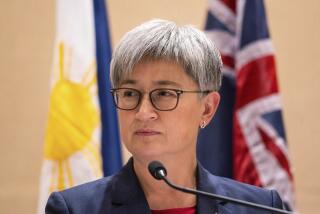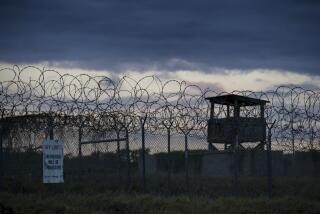Ex-Guantanamo inmate is released
- Share via
ADELAIDE, AUSTRALIA — An Australian who fought alongside the Taliban and later pleaded guilty to supporting terrorism was freed from prison today after completing a sentence imposed by a U.S. military tribunal at Guantanamo Bay, Cuba.
David Hicks, who was captured in Afghanistan in December 2001, served more than five years at the Guantanamo prison before pleading guilty to providing material support to the Al Qaeda terrorist network. He was sent to Australia in March to serve out his sentence.
When the 32-year-old former kangaroo skinner left South Australia state’s Yatala prison, he was met by his father and a lawyer and driven away in a civilian car with a police escort.
Dozens of reporters and about 20 supporters gathered, but Hicks did not stop to comment. His father, Terry, and lawyer David McLeod later read a short statement, in which Hicks said he recognized “the huge debt of gratitude” he owed his supporters for helping to secure his release.
Hicks refused to speak to the news media directly for fear of being sent back to Guantanamo Bay. Under his plea deal, Hicks agreed to remain silent about his time and treatment in custody, and forfeited any right to appeal. He agreed not to speak with the news media for a year from his sentencing date.
During his incarceration at Guantanamo, Hicks became somewhat of a cause celebre in Australia, where many criticized former Prime Minister John Howard for allowing an Australian to languish for years in a foreign jail without trial.
Last week, a federal magistrate ruled that Hicks was a security risk because of the training he received in Afghan terrorist camps. The court was told he met Osama bin Laden at least 20 times, describing him as a “lovely brother” in letters home.
The magistrate ordered him to report to police three times a week and obey a curfew. Other restrictions include that he not leave Australia or contact anyone on a list of terrorism suspects for one year.
Throughout the case, Hicks’ lawyers referred to him as a misguided adventurer who went to Afghanistan only because his application to join the Australian army had been rejected because of his lack of education.
More to Read
Sign up for Essential California
The most important California stories and recommendations in your inbox every morning.
You may occasionally receive promotional content from the Los Angeles Times.













